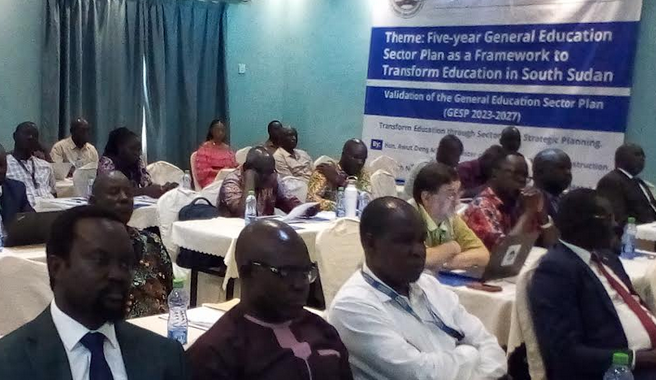The National Ministry of General Education and Instruction has said it has registered a marked increase in the number of children who are out of school mainly as a result of the floods that hit large wasths of the country.
Acting Minister of Education and Instruction Martin Tako Moyi made the revelation on Tuesday in Juba during the Validation of the General Education Sector Plan (GESP 2023-2027).
Addressing officials drawn from the education ministries of the 10 states, 3 administrative areas, and education sector partners, Tako highlighted several challenges contributing to hindering the learning environment, especially in states affected by floods such as Unity, Lakes, and Upper Nile among others.
On this basis, Tako said the Five Year General Education Sector Plan will act as a framework to transform the sector in South Sudan.
He stated that currently, the number of out-of-school children stands at 2.8 million children compared to 2.2 million in 2018.
“The issue of out-of-school children which is now 2.8 million, is not only the responsibility of the ministry but that of the whole government including the line ministries. The general education sector plan implementation will help that this complexity will not get in the way of the management and implementation of GESP activities,” he said. “The number of out-of-school children keeps increasing instead of reducing, from 2.2 million in 2018, it is now more than 2.8 million. There are a lot of circumstances but let me just cite a practical one. The floods submerged Unity, Jonglei, and Greater Pibor Administrative Area among others.”
The minister further stated that COVID-19, conflict, and the torrential rains which led to flooding stopped many children from attending classes and destroyed schools.
Tako urged the state education ministers and sector partners to ensure that the resolutions of the validation workshop are used to address some of the challenges forcing children out of school.
Speaking on behalf of the state education ministers, Lake State Minister of General Education and Instruction Nelson Makoi said the sector plan is very important because it guides schools on key priorities.
“This plan is key and crucial for all of us and it is going to inform some of us in the states on how to implement the key priorities and deal with the challenges we face in many areas,” he said. “We in the states are the immediate people to work with the schools and we are the same people who will supervise the schools.”
“The national ministry of education works on policies and then it sends us for quick implementation,” Makoi added.




